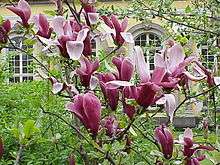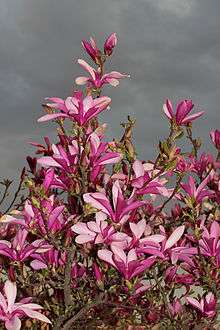Magnolia liliiflora
| Mulan magnolia | |
|---|---|
 | |
| A Magnolia liliiflora flower | |
| Scientific classification | |
| Kingdom: | Plantae |
| (unranked): | Angiosperms |
| (unranked): | Magnoliids |
| Order: | Magnoliales |
| Family: | Magnoliaceae |
| Genus: | Magnolia |
| Subgenus: | M. subg. Yulania |
| Section: | M. sect. Yulania subsect. Yulania |
| Species: | M. liliiflora |
| Binomial name | |
| Magnolia liliiflora Desr. | |
| Synonyms[1] | |
| |
Magnolia liliiflora (variously known by many names, including Mulan magnolia, Purple magnolia, Red magnolia, Lily magnolia, Tulip magnolia, Jane magnolia and Woody-orchid) is a small tree native to southwest China (in Sichuan and Yunnan), but cultivated for centuries elsewhere in China and also Japan. It was first introduced to English-speaking countries from cultivated Japanese origins, and is thus also sometimes called Japanese magnolia, though it is not native to Japan. It is now also planted as an ornamental in North America and Europe, though rather less often than its popular hybrid (see below).
It is a deciduous shrub, exceptionally a small tree, to 4m tall (smaller than most other magnolias), and blooms profusely in early spring with large pink to purple showy flowers, before the leaf buds open.
This species is one of the parents of the very popular hybrid Saucer magnolia, M. x soulangeana, the other parent being the Yulan magnolia, M. denudata.

 The Saucer magnolia (Magnolia × soulangeana is a hybrid of which Magnolia liliiflora is one of the parents |
 Part of a Mulan tree in flower |
 Mulan tree in flower |
Notes
- ↑ The Plant List: A Working List of All Plant Species, retrieved 29 May 2016
References
- eFloras, Missouri Botanical Garden & Harvard University Herbaria (FOC Vol. 7 Page 51, 71, 75, 77), Magnolia liliiflora, retrieved 2009 Check date values in:
|access-date=, |date=(help)
| Wikimedia Commons has media related to Magnolia liliiflora. |